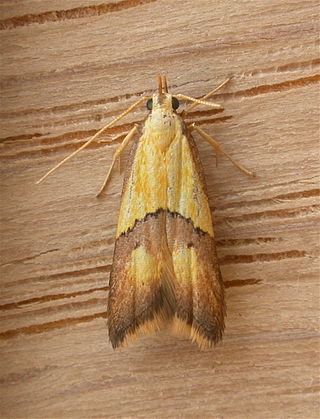
The Lecithoceridae, or long-horned moths, are a family of small moths described by Simon Le Marchand in 1947. Although lecithocerids are found throughout the world, the great majority are found in the Indomalayan realm and the southern part of the Palaearctic realm.

The Archipini are a tribe of tortrix moths. Since many genera of these are not yet assigned to tribes, the genus list presented here is provisional.
Ornativalva is a genus of moths in the family Gelechiidae.
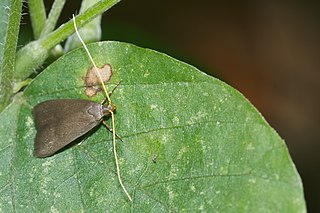
The Lecithocerinae are a subfamily of small moths in the family Lecithoceridae. They are found worldwide, but most species occur in South Asia. The subfamily is characterized by the male genitalia with a bridge-like structure connecting the tegumen and the valva, and the uncus almost always is vestigial with two lobes at the dorsal base, only exceptionally united into a broad plate, but never as a thorn or spine.

Asaphodes is a genus of moths in the family Geometridae erected by Edward Meyrick in 1885. This genus is endemic to New Zealand and species within this genus are found throughout New Zealand including the North, South and Stewart / Rakiura Islands.

Anatrachyntis is a genus of moths in the family Cosmopterigidae. Some authors include it in Pyroderces.
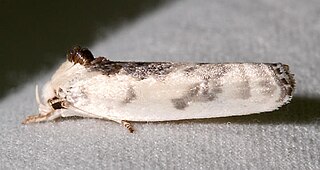
Antaeotricha is a genus of moths. It is the largest genus in the subfamily Stenomatinae, numbering over 400 species in the Western Hemisphere.

Xyloryctidae is a family of moths contained within the superfamily Gelechioidea described by Edward Meyrick in 1890. Most genera are found in the Indo-Australian region. While many of these moths are tiny, some members of the family grow to a wingspan of up to 66 mm, making them giants among the micromoths.
Ornativalva heluanensis is a moth of the family Gelechiidae. It was described by Debski in 1913. It is found in Spain, Croatia, Ukraine and Russia, as well as on the Canary Islands, Sicily, Malta and Cyprus. Outside Europe, it is found in North Africa, Sudan, Israel, Syria, Turkey, Saudi Arabia, Iraq, Iran, Afghanistan, Pakistan and Mongolia.
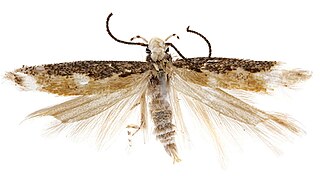
Gelechiinae is a subfamily of moths in the family Gelechiidae. It was described by Henry Tibbats Stainton in 1854.

Anacampsinae is a subfamily of moths in the family Gelechiidae.

Anomologinae is a subfamily of moths in the family Gelechiidae.
Ornativalva caecigena is a moth of the family Gelechiidae. It was described by Edward Meyrick in 1918. It is found in Saudi Arabia, Kuwait, southern Iran (Luristan) and Pakistan.
Ornativalva mixolitha is a moth of the family Gelechiidae. It was described by Edward Meyrick in 1918. It is found in Morocco, Algeria, Tunisia, southern Russia, Turkey, Sudan, Iraq, Iran, Afghanistan, Pakistan, India (Bihar) and Mongolia.
The Torodorinae are a subfamily of small moths in the family Lecithoceridae.

The Stenomatinae are a subfamily of small moths in the family Depressariidae.
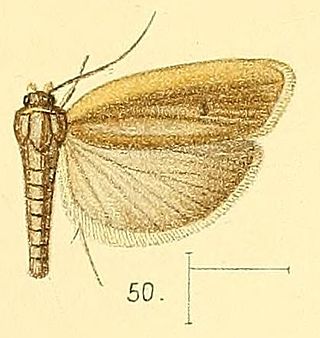
Stenoma is a genus of moths. The type species is Stenoma litura, which was described by Philipp Christoph Zeller in 1839.

Cryptophasa is a genus of moths of the family Xyloryctidae.












